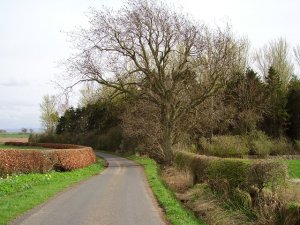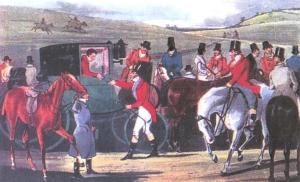Endurance is a particular quality generally associated with rakes. If this brings to mind a certain activity, you may also be aware that one doesn’t have to read above one Regency romance a year to understand the significance of this attribute. However, in polite circles, a rake’s endurance is assessed by his performance in the, er, field.
Hunting field, that is.

Fox covert in Scotland – The copyright on this image is owned by Richard Webb and is licensed for reuse under the Creative Commons Attribution-ShareAlike 2.0 license
In those days, various groups hunted all throughout England–many more than at present, I daresay. Hunts were organized around the leadership of a well-known figure in the district, or locality–usually a member of the gentry or aristocracy. The range of a hunt might cover hundreds (or more) acres and the terrain could be decidedly rugged. A gentleman’s consequence could be made or broken, given his performance in the field.
“Your father tells me, Miss Marlowe, that you are a notable horsewoman.”
“Does he?” she responded. “Well, he told us you showed him the way with the Heythrop.”
He glanced down quickly at her, but decided, after an instant, that this remark sprang from inanity. “I imagine that I need not tell you that I did no such thing!”
“Oh, no! I am very sure you did not.”
To show anyone the way with a celebrated hunt like the Heythrop (side note: this is the current Prime Minister’s hunt) was high praise indeed. Miss Marlowe in Sylvester, or, The Wicked Uncle, piqued the Duke of Salford when she averred over his ability of riding to hounds.
Heyer at her most clever.
Even as intrepid a heroine as Miss Marlowe would agree there was no more bruising rider than John Mytton. It was said his abilities were known in every county–particularly his endurance. Hunting was the sport that taxed a rider for jumping various obstacles and “often in weather not fit for man nor beast.” In addition to hunting with his own pack, he would hunt with other packs throughout Shropshire.
“During the period of Sir Bellingham Graham hunting Shropshire, (Mytton) performed several gallant feats in the field. Whilst suffering severely from the effects of a fall, and with his right arm in a sling, he rode his favourite hunter, Baronet, over the park paling of the late Lord Berwick..to the astonishment of the whole field–Sir Bellingham himself exclaiming, “Well done, Neck or Nothing; you are not a bad one to breed from.” — Life of Mytton, Nimrod
And now we come full circle.


Nicely done! Full circle indeed – so good:)
LikeLike
Thank you!
LikeLike
And I thought it might refer to another activity. Grin.
The hunt, the activity of gentleman and best done by a rake in any romance.
Thank you!
LikeLike
Great minds think alike–I’m glad you enjoyed the post, Sandy!
LikeLike
Love that! G. Heyer is my favorite.
LikeLike
Heyer is incomparable. Thanks for stopping by!
LikeLike
Wonderful post and excerpt!
LikeLike
I’m glad you liked it, Ally.
LikeLike
You know how much I love GH. Sylvester is one of my favorites. Great segway, to Mytton.
LikeLike
I do know how much you love GH. Your “Seduction” book is about another great Phoebe, I might add.
LikeLike
Brilliant !! As one who rode to hounds when I was MUCH younger I really appreciate this post and of course the GH reference! LOVE Sylvester! I have the CD’s of Richard Armitage reading Sylvester. HEAVEN!
LikeLike
I should very much like to hear Armitage recreate the voice of that other famous sportsman in Sylvester: “I fancy you’d been told, if you was to ask anyone, that Nugent Fotherby is as shrewd as he can hold together.” A perfect foil for the hero.
LikeLike
Pingback: Spring has Sprung (This Statement Valid in Select Locations) | Not So Distant Past